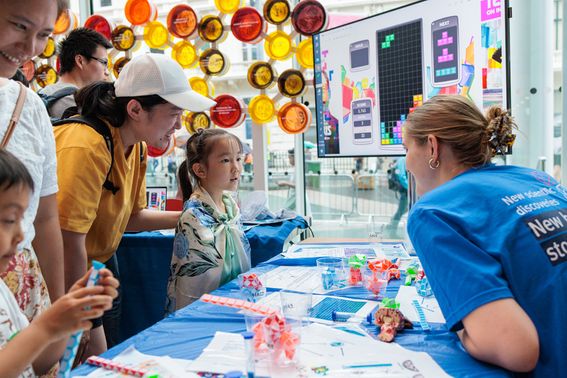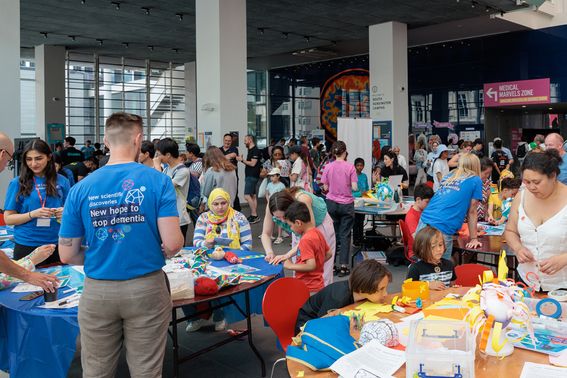Outreach

UK DRI researchers take part in Imperials’ annual Great Exhibition Road Festival 2023!
A festival celebrating science, creativity and innovation
On 17-18th June 2023, over 20 UK DRI researchers, from PhD students to Group Leaders, headed to South Kensington to host stalls showcasing our research at the The Great Exhibition Road Festival.
It was great to see the level of enthusiasm and engagement of the general public in the work we do. For me, it helped reaffirm the importance of our research Alan Murphy PhD student, Skene lab
Stationed at the main entrance to the College, our stalls gained lots of attention across the weekend. With an array of fun activities on offer: Tetris blocks of aggregating proteins, DNA double helix origami, and colourful paper brain hats, visitors of all ages and backgrounds were actively engaged whilst learning about our scientific efforts in the field as part of the UK’s largest investment in dementia research. By communicating several aspects of our research, participants gained an insight into some of the complexities of neurodegenerative diseases and how we aim to address them.
The science behind our stalls
Protein aggregation
Stall led by President's PhD Scholar, Matilda Burridge (Ye lab).
One of the key pathological hallmarks of Alzheimer’s disease is the build-up of aggregated β-amyloid protein in the brain. The aberrant accumulation of amyloid plaques corresponds with the neuronal cell loss seen in AD.
In this activity, we illustrated the aberrant misfolding and subsequent toxic accumulation of β-amyloid using Tetris and magic snake blocks. The small malleable models represented various stages of protein folding: unfolded, correctly folded and fully functional, misfolded and dysfunctional. Participants were shown these three states and encouraged to unfold the tangled and 'misfolded' protein into a straight 'unfolded' state. In doing so, aiming to promote targeting of the unfolded protein for proteasomal degradation -effectively clearing the toxic proteins. Additionally, Tetris was used to illustrate how misfolded proteins accumulate in neurodegenerative diseases.
Read more about the Ye Lab and their work studying proteasome systems in Alzheimer's disease.
Epigenetics
Stall led by Dr Alexi Nott and Dr Sarah Marzi.
Epigenetics describes the small chemical modifications on DNA that are influenced by lifestyle/environmental factors. These alterations can change the way our genes are read and modify cell function.
In this activity, balls of cotton wool on a wooden skewer represented histones: the proteins around which our DNA is wrapped and stored in each of our cells. To demonstrate how epigenetic changes lead to downstream changes in cell function, the 'DNA', a long piece of thread, was wrapped around the histones, and small colourful marks were dotted around - signifying the epigenetic additions.
The small chemical modifications structurally impact the distance between histones and how exposed the DNA wrapped around them is to gene activating or gene inhibiting transcriptional factors. By altering the distance between histones on the skewer, participants gained an understanding of the mechanism by which epigenetic changes influence levels of gene expression.
Read more about the research groups at the Centre studying epigenetic changes in neurodegenerative diseases on the Neurogenomics page.
Try these activities at home!
Origami print-out and online instructions
Epigenetic gene regulation how-to (activity #2)
Brain regions affected in dementia
Stall led by Dr Johanna Jackson and Dr Diana Benitez, in collaboration with art educator Bethan Durie.
In neurodegenerative diseases, pathological protein aggregation leads to neuronal cell death in distinct brain regions. Degeneration in these specific brain areas is what causes the characteristic symptoms of different types of dementia. In this workshop, visitors were invited to colour-in and build their own paper brain hats whilst learning about the functions of the various brain regions and their significance in different dementias.
Our Multi-Omics Atlas Project (MAP), led by Dr Johanna Jackson, was set up to map the cell-type specific changes across the Alzheimer's disease brain. Read more about the groundbreaking study on the MAP page.
The festival in photos

Matilda Burridge, President's PhD Scholar, demonstrated the importance of protein misfolding in dementia. (c) Brendan Foster

Using practical activities, visitors could actively participate and explore the topics with a creative, hands-on approach. (c) Brendan Foster
NA

The double helix structure of DNA was illustrated using colourful origami patterns. (c) Brendan Foster

The festival hosted over 50,000 visitors this year! (c) Thomas Angus


